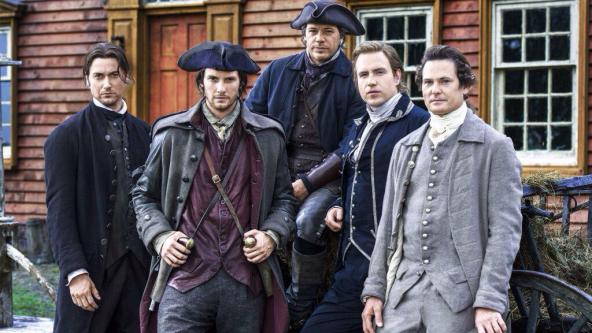 For several weeks, I’ve been posting reviews for the History Channel’s Sons of Liberty series on my Facebook page. It quickly became obvious that the history was going to be sacrificed on the altar of entertainment. In his article, Tom Verenna dissected the series in a powerful way. But, Buck Sexton made a great point that, if the show isn’t entertaining, then it doesn’t matter if the history is right, no one will watch it.
For several weeks, I’ve been posting reviews for the History Channel’s Sons of Liberty series on my Facebook page. It quickly became obvious that the history was going to be sacrificed on the altar of entertainment. In his article, Tom Verenna dissected the series in a powerful way. But, Buck Sexton made a great point that, if the show isn’t entertaining, then it doesn’t matter if the history is right, no one will watch it.
Okay. Makes sense. And a few friends were watching it and enjoying it despite it’s historical blasphemy. So, we watched it this weekend. It’s three episodes, each about two hours long.
And? What was my review? A full discussion of the April 19th, 1775 segments will follow in a series of posts. But for now, let’s just say this: I cried through most of the second episode and half of the third.
Tears of Joy? Because I was seeing the settings and people I have come to love and respect and. . . Love on the screen before me, period settings and clothes on display? Because I was so very entertained?
Well, no. Though I did enjoy the period clothes and settings. Anything that makes 1775 come alive before us is good, I suppose. And, as long as I could watch it with my movie watching hat on, I was entertained. But that became harder and harder to do after the first episode.
Tears of what then?
I think grief. Sadness. My husband posted today on his Facebook page that “the sheer distortion of the people and events that she has come to love ripped right through her.” He’s right.
The drama of April 19th, 1775 was the stuff legends are made of. Most Americans have never even heard of the heroes and heroines of that day. And if they have, Paul Revere comes to mind, what they know is mixed with myth and fabrications. A three part series could be made of that day, sticking moment by moment to the truth of that day and it would be just as entertaining as this series, if not more so. It was the day America became America. It was the true birthday of our nation.
And while I don’t really want to take apart this series bit by bit – some will see it as being just so very negative – I want my readers to know the truth. I think the truth is even better than the Sam and Paul’s Excellent Adventure that the History Channel brought us. And, where I can, I’ll give kudos. There are a few kudos to be had.
So, go watch the series with the History Channel app before mid month, while it’s free. And watch for my coming posts.

 This formation in the Garden of the Gods is called the Kissing Camels. As you can see, the humps on the camels are not even close to the same size – heck one hump isn’t even on the same rock. So, from some vantage points you can see a humpless camel. This has led to a rather common myth – that one of the camels humps broke off.
This formation in the Garden of the Gods is called the Kissing Camels. As you can see, the humps on the camels are not even close to the same size – heck one hump isn’t even on the same rock. So, from some vantage points you can see a humpless camel. This has led to a rather common myth – that one of the camels humps broke off.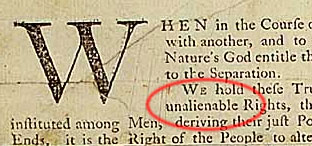 Just a little grammar lesson…words have meaning. Especially in court, whose language and thought processes are based in the dead (not open to change) and very specific Latin language.
Just a little grammar lesson…words have meaning. Especially in court, whose language and thought processes are based in the dead (not open to change) and very specific Latin language. I have a dear, sweet friend who is something of a throwback to an earlier, more genteel time. I don’t think she’d mind this characterization. She’s absolutely lovely. The first time I heard her excuse herself and her little girl to “use the loo” I simply smiled. It was totally in character.
I have a dear, sweet friend who is something of a throwback to an earlier, more genteel time. I don’t think she’d mind this characterization. She’s absolutely lovely. The first time I heard her excuse herself and her little girl to “use the loo” I simply smiled. It was totally in character.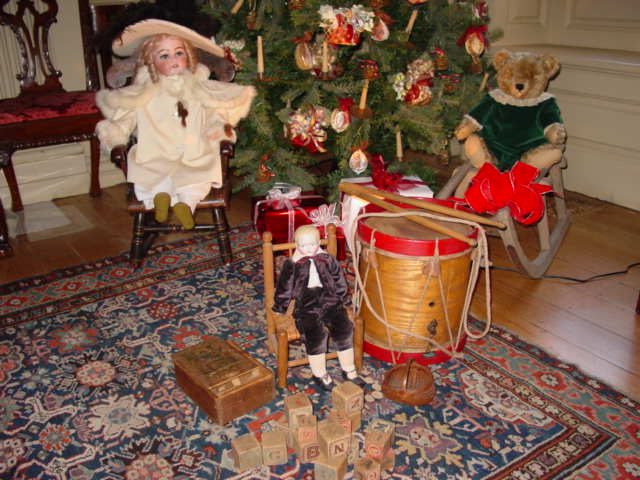 Do a Google search for “Colonial Christmas” and you’ll find that many of the historic homes are all decked out for the holidays.
Do a Google search for “Colonial Christmas” and you’ll find that many of the historic homes are all decked out for the holidays.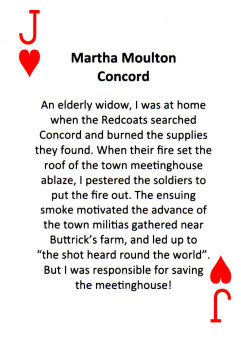 Martha Moulton. Well, I’m glad to know her name. She must have been something. All I’ve ever heard was that it was an old woman who harangued the Redcoats that day.
Martha Moulton. Well, I’m glad to know her name. She must have been something. All I’ve ever heard was that it was an old woman who harangued the Redcoats that day.  And so I’m fleshing out secondary characters. The men who marched off early on the morning of April 19th, and the community that waited at home. I needed a list of the men who marched with Hannah’s husband that day. Simple enough, right. I mean, this is the age of the Internet.
And so I’m fleshing out secondary characters. The men who marched off early on the morning of April 19th, and the community that waited at home. I needed a list of the men who marched with Hannah’s husband that day. Simple enough, right. I mean, this is the age of the Internet. Here’s another treasure from Charles Hudson’s History of the Town of Lexington Massachusetts (1868)
Here’s another treasure from Charles Hudson’s History of the Town of Lexington Massachusetts (1868)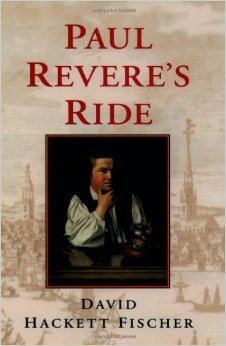
 As I write this blog post, the people of Scotland are voting – on Independence. As an American, even the mention of voting on “Independence” makes my heart sing. That’s likely a purely American reaction. Or is it?
As I write this blog post, the people of Scotland are voting – on Independence. As an American, even the mention of voting on “Independence” makes my heart sing. That’s likely a purely American reaction. Or is it?